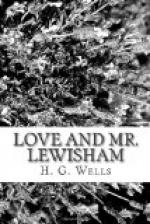“I mean, dogma. But we must argue this out in comfort. It is our supper hour, and I’m not the man to fight against accomplished facts. We have intermarried. There it is. You must stop to supper—and you and I must thresh these things out. We’ve involved ourselves with each other and we’ve got to make the best of it. Your wife and mine will spread the board, and we will go on talking. Why not sit in that chair instead of leaning on the back? This is a home—domus—not a debating society—humble in spite of my manifest frauds.... That’s better. And in the first place I hope—I do so hope”—Chaffery was suddenly very impressive—“that you’re not a Dissenter.”
“Eh!” said Lewisham, and then, “No! I am not a Dissenter.”
“That’s better,” said Mr. Chaffery. “I’m glad of that. I was just a little afraid—Something in your manner. I can’t stand Dissenters. I’ve a peculiar dislike to Dissenters. To my mind it’s the great drawback of this Clapham. You see ... I have invariably found them deceitful—invariably.”
He grimaced and dropped his glasses with a click against his waistcoat buttons. “I’m very glad of that,” he said, replacing them. “The Dissenter, the Nonconformist Conscience, the Puritan, you know, the Vegetarian and Total Abstainer, and all that sort of thing, I cannot away with them. I have cleared my mind of cant and formulae. I’ve a nature essentially Hellenic. Have you ever read Matthew Arnold?”
“Beyond my scientific reading—”
“Ah! you should read Matthew Arnold—a mind of singular clarity. In him you would find a certain quality that is sometimes a little wanting in your scientific men. They are apt to be a little too phenomenal, you know, a little too objective. Now I seek after noumena. Noumena, Mr. Lewisham! If you follow me—?”
He paused, and his eyes behind the glasses were mildly interrogative. Ethel re-entered without her hat and jacket, and with a noisy square black tray, a white cloth, some plates and knives and glasses, and began to lay the table.
“I follow you,” said Lewisham, reddening. He had not the courage to admit ignorance of this remarkable word. “You state your case.”
“I seek after noumena,” repeated Chaffery with great satisfaction, and gesticulated with his hand, waving away everything but that. “I cannot do with surfaces and appearances. I am one of those nympholepts, you know, nympholepts ... Must pursue the truth of things! the elusive fundamental ... I make a rule, I never tell myself lies—never. There are few who can say that. To my mind—truth begins at home. And for the most part—stops there. Safest and seemliest! you know. With most men—with your typical Dissenter par excellence—it’s always gadding abroad, calling on the neighbours. You see my point of view?”
He glanced at Lewisham, who was conscious of an unwonted opacity of mind. He became wary, as wary as he could manage to be on the spur of the moment.




